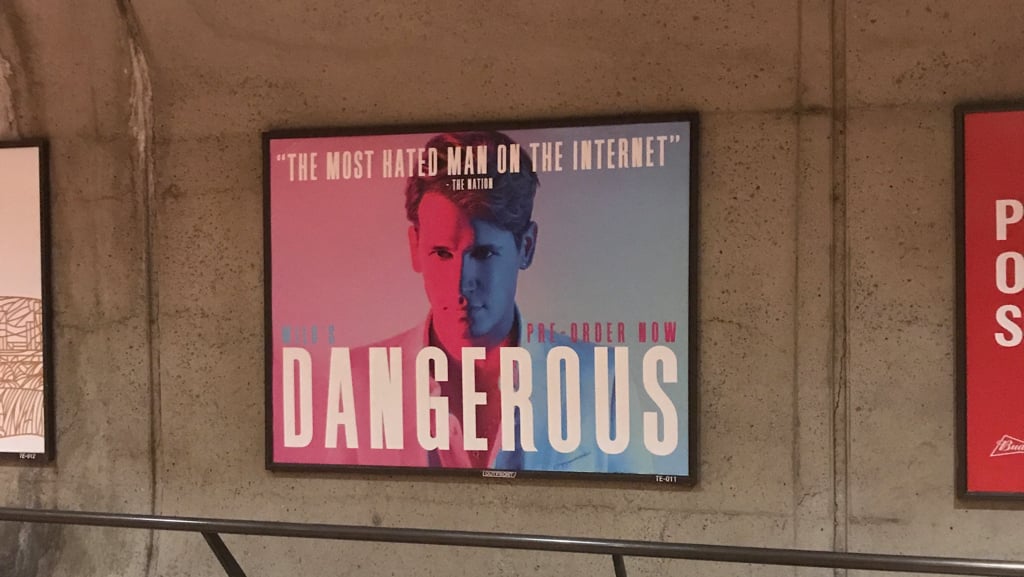The Washington Metropolitan Area Transit Authority is removing billboards posted around Metro stations for a new book by former Breitbart writer Milo Yiannopoulos, citing its rules against political and issue-oriented advertising. The ads, which were spotted around the transit system earlier this week, show Yiannopulous’s face behind the title of his book, Dangerous, which he self-published on Tuesday.
“We reviewed the ad, we found it violated our guidelines,” says Metro spokesman Richard Jordan.
Metro tightened its rules on political advertising in 2015 after multiple ad purchases by anti-Islam activist Pamela Geller stirred complaints from Metro riders. The regulations say “advertisements that promote or oppose any religion, religious practice, or belief are prohibited.” While WMATA’s advertising spaces are sold by a contractor, Outfront Media, the transit agency reserves the right to block certain campaigns.
That was the case with the cancellation of billboards for Yiannopoulos’s book, says Jordan, although WMATA would not go into specifics about how the the book ran afoul of the guidelines. While many of Yiannopoulos’s publicly stated positions would appear to violate Metro’s rules—he has courted outrage with his verbal and often outlandish attacks of Islam, feminism, the Black Lives Matter movement, and individuals like the comedian Leslie Jones—the posters for his book were relatively unadorned.
Yiannopoulos was dismissed from Breitbart in February after video surfaced in which he appeared to be condoning pedophilia. Yiannopoulos disputes what the video portrays, but the episode was enough for his then fellow Breitbart staffers to threaten a walkout, for him to lose a speaking slot at the Conservative Political Action Conference, and for Simon & Schuster to rescind his book contract, which led Yiannopoulos to self-publish. (Yiannopoulos sued Simon & Schuster in New York for $10 million on Friday.)
In an email to Washingtonian, Yiannopoulos sounds eager that Metro’s decision to pull ads for his book will stoke more profile-raising controversy.
“Shocking no one, the Washington D.C. Metro—the public transportation system of the swamp itself—has banned ads for my book,” he writes. “You already knew the mainstream media doesn’t want you to read Dangerous, now you can add the government to that list. What leftists fail to realize is that every banned ad, every negative review, and every nasty article about me is a ringing endorsement to the people that really matter—real Americans.”
WMATA told Yiannopoulos that the ads for his book violated two rules in particular: “Advertisements intended to influence members of the public regarding an issue on which there are varying opinions are prohibited” and “Advertisements that are intended to influence public policy are prohibited.”
But the billboards, as they appeared, displayed Yiannopoulos’s face, the book’s title, and a blurb describing him as “the most dangerous man on the internet,” not overt political content. “We didn’t have anything to say about issues or policy, unless you consider my face to be a political statement,” Yiannopoulos writes. “So I have a simple question for the D.C. Metro. Which advertisements do not break those policies? Is my face a hate crime?”
Metro’s run into other incidents since revising its advertising policy. In January, it blocked an ad buy by Carafem, a Chevy Chase clinic that offers birth-control services, deciding that billboards for an abortion pill amounted to “issue-oriented” advertising. Carafem responded by mounting its ad on flatbed truck and parking the vehicle outside Metro’s headquarters.
Yiannopoulous says he plans to push back on Metro’s decision with his ads. “We were not contacted by the DC [W]MATA or given an opportunity to speak with anyone before our ads began to be pulled down,” he writes. “We believe that the removal of our billboards constitutes unconstitutional viewpoint discrimination by a government regulator in violation of the First Amendment and are preparing our response now.”



















